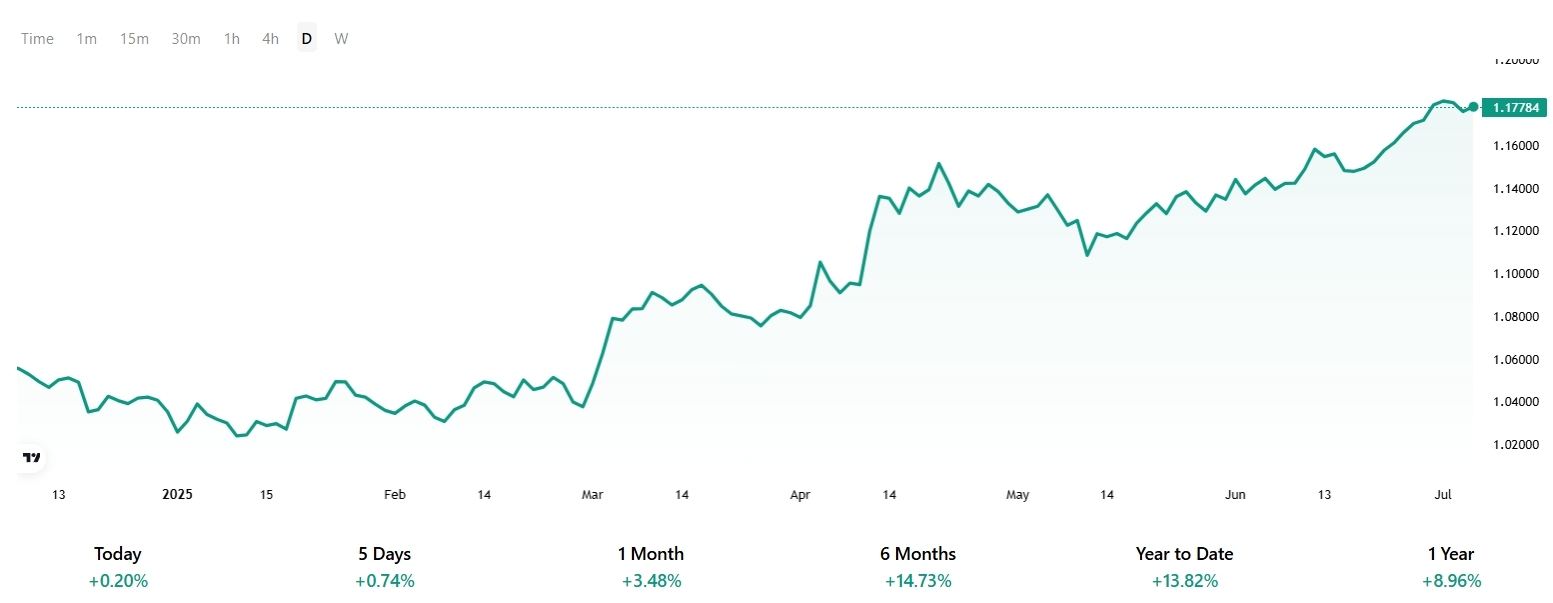What Happens If the Euro Hits 1.20? ECB Is Uneasy while Bessent Says Europe Can’t Handle a Strong Euro Moment

TradingKey - The U.S. dollar’s sharp decline in H1 2025 has lifted non-dollar currencies, with the euro appreciating around 14% against the greenback — aligning with European Central Bank (ECB) President Christine Lagarde’s vision of a “Global Euro Moment.” However, the recent strength in EUR/USD has raised concerns among policymakers, with U.S. Treasury Secretary Scott Bessent joking that Europeans may soon be “screaming” over the euro’s strength.
As of July 4, the EUR/USD exchange rate had risen about 3.50% in the past month, reaching 1.1874 — marking a 14% gain year-to-date in 2025. Meanwhile, the DXY U.S. Dollar Index fell by 10.8% in the first half of 2025, its worst start since the early 1970s.

EUR/USD Exchange Rate, Source: TradingKey
Lagarde’s “Euro Moment”
In mid-June, ECB President Christine Lagarde wrote that the global shift in monetary dominance has occurred before — and now is Europe’s chance to seize the moment and enter a "Global Euro Moment."
Currently, the euro remains the world’s second most-used currency, accounting for about 20% of global foreign exchange reserves, well behind the U.S. dollar’s 58% share.
If Europe can capitalize on the current global realignment, it could benefit from lower borrowing costs, reduced exchange rate volatility and greater resilience against sanctions and external policy pressure.
However, the euro’s recent appreciation is raising alarms at the ECB, as a stronger euro threatens its export-dependent economy.
Global investors are closely watching the psychological level of 1.20, a far cry from earlier speculation about euro parity with the dollar.
On Tuesday, July 1, ECB Vice President Luis de Guindos, speaking at the ECB annual forum in Sintra, Portugal, said the central bank should avoid any form of exchange rate overshooting.
While the ECB is currently comfortable with EUR/USD around 1.18, moving beyond 1.20 would complicate the outlook.
A Double-Edged Sword for Europe
From both import and export perspectives, a rising euro poses risks:
- A stronger euro lowers import prices, helping to reduce inflation — something Europe has struggled with since the post-pandemic surge.
- But a higher euro also raises export costs, creating challenges for Europe's trade-reliant economies — especially amid Trump’s new tariffs.
Financial Times citing ECB officials reported that the ECB may need to express more clearly its discomfort with euro strength, as the risk of undershooting the 2% inflation target rises.
For the U.S., Treasury Secretary Scott Bessent said on July 3 that while a strong euro may cause discomfort in Europe, the U.S. can withstand the pressures of being a reserve currency.







